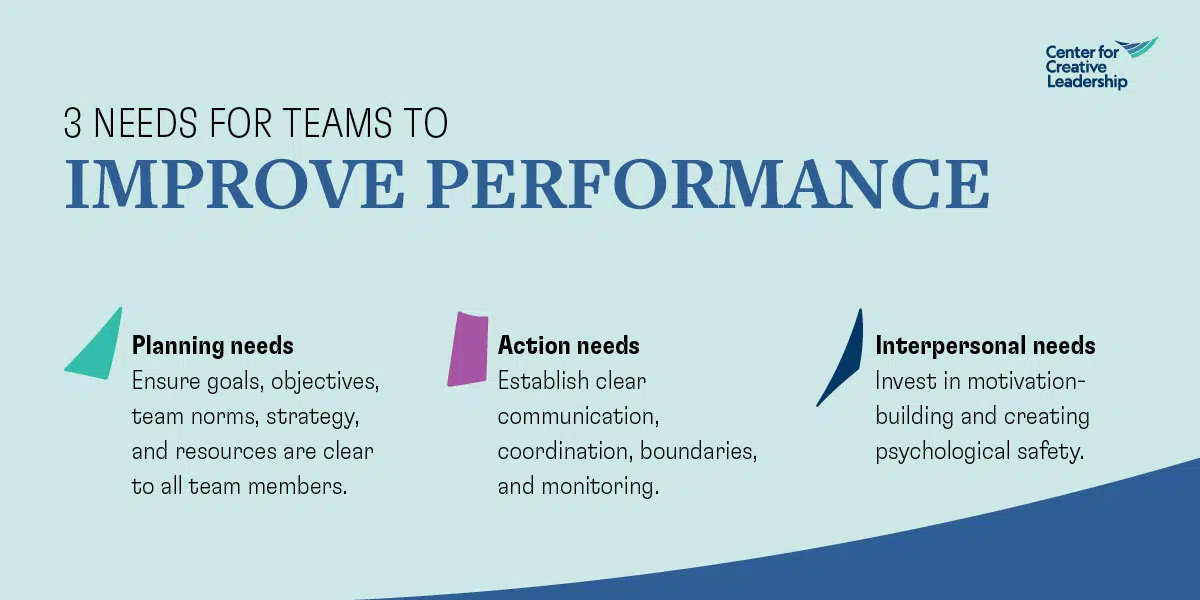Understand What Teams Need to Succeed
Anybody who’s contributed to a team knows that teamwork comes with a unique set of challenges — getting commitment from all team members, reconciling different and sometimes competing agendas, uniting behind a shared purpose — the list goes on.
Depending on where they are in the team “life cycle,” teams need different resources to navigate business and interpersonal challenges — and to have a positive impact on their organizations.
When team members understand what their team needs, they have a way to identify and discuss what’s working well and what isn’t. Teams can then be more focused and proactive in making changes that will address needs and lead to better team performance.
What Teams Need to Perform Across 3 Phases
#1 Team Need: Planning
This phase takes place both when the team is planning actions to take or evaluating the impact of actions that were taken. Whether new, reconfigured, or floundering, teams will find that team performance benefits from giving time and attention to 6 team needs around planning:
1. Team charter
Are overall objectives, resources, and constraints defined and clear to all team members? Learn more about how to create a team charter.
2. Goals
What are the measurable team outputs and related milestones?
3. Team norms
What standards of behavior do team members agree to? How will they handle routine issues, such as how work is divided or how disagreements are to be resolved? Setting and agreeing upon team norms also help members address unexpected or complex situations.
4. Task performance strategy
What’s the overall approach the team will take? What key actions are needed to achieve goals?
5. Shared understanding
Do team members have a common perspective? What key assumptions may affect performance? Teams can easily be tripped up by different beliefs about the challenges the team faces, the tools or resources available, or the desired working relationships among team members, for example.
6. Team memory
What relevant knowledge, information, and skills do team members possess or have access to? What gaps exist?
# 2 Team Need: Action
When teams are in action — engaged in activities that directly lead to goal accomplishment — they have 6 team needs to support action:
1. Monitoring output
How does the team track and communicate progress?
2. Monitoring systems
What methods or resources are available for tracking people, budgets, and information — and for keeping up with stakeholders, markets, or other external factors?
3. Coordination
How does the team prioritize and sequence key activities and events?
4. Communication
Do team members communicate openly with each other? Does the team experience a high-quality exchange of ideas and information?
5. Monitoring team behavior
How is feedback given to team members? (Hint: Use our Situation-Behavior-Impact (SBI)™ feedback model to discuss impact vs. intent.)
6. Boundaries
How and when does information flow with other groups or units? Are behaviors present for spanning boundaries effectively?
#3 Team Need: Interpersonal
In addition to team needs that arise in the planning and action phases, teams also have 4 team needs in the interpersonal arena:
1. Motivation-building
Do team members have a sense of personal accountability for performance? Is the team cohesive and motivated?
2. Psychological safety
Is there a sense of trust on the team? Are team members able to speak their minds, knowing they’ll be respected and listened to? (This is key for psychological safety at work.)
3. Emotion management
How does the team handle emotions? Setbacks, frustration, and even overconfidence can cause an emotional strain among team members. Are there teamwork blockers or activators?
4. Conflict management
Do differences of opinion prevent the team from meeting its goals? Does the team allow healthy debate while avoiding personal attacks or acrimony? How skilled are team members at addressing and reducing conflict in the workplace?
A Final Word on Team Needs
When a team is underperforming, faltering, or flat-out failing, look carefully at what’s missing. What behaviors are required to meet team needs? Whether your team is in planning or action mode, understanding these sets of team needs — interpersonal included — will help you as a leader know how to gather the resources you need to get the job done. And if you’re looking for more insights into team needs and dynamics, explore our team effectiveness framework.
Ready to Take the Next Step?
We can partner with you for team development designed to give teams and their leaders the skills needed to succeed and improve team performance by meeting team needs.









